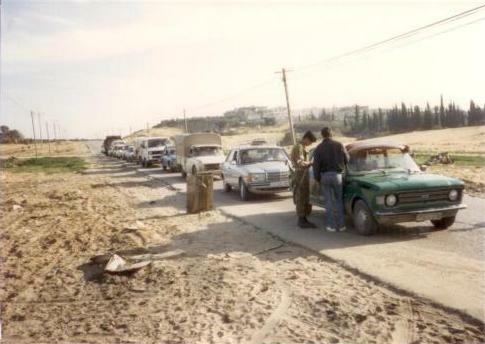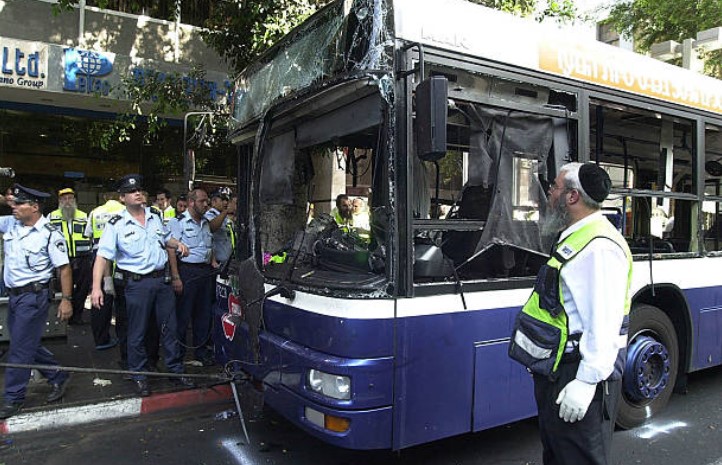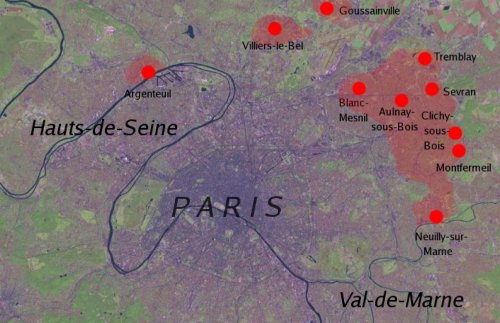|
Intifadas
An intifada ( ar, انتفاضة ') is a rebellion or uprising, or a resistance movement. It is a key concept in contemporary Arabic usage referring to a legitimate uprising against oppression.Ute Meinel ''Die Intifada im Ölscheichtum Bahrain: Hintergründe des Aufbegehrens von 1994-1998,''LIT Verlag Münster, 2003 p.10: 'Der Begriff der Intifada, der die Vorstellung eines legitimen Ausbebegehrens gegen Unterdrückung enthält, ist gegenwärtig ein Schlüsselbegriff in der arabischen Welt, von dem eine grosse emotionale Anziehungskraft ausgeht.' Etymology ''Intifada'' is an Arabic word literally meaning, as a noun, "tremor", "shivering", "shuddering".Mary K.Roberson, 'Birth, Transformation, and Death of Refugee Identity: Women and Girls of the Intifada,' in Ellen Cole,Esther D Rothblum,Oliva M Espin (eds.''Refugee Women and Their Mental Health: Shattered Societies, Shattered Lives,''Routledge, 2013 p.42. It is derived from an Arabic term ''nafada'' meaning "to shake", "shake ... [...More Info...] [...Related Items...] OR: [Wikipedia] [Google] [Baidu] |
First Intifada
The First Intifada, or First Palestinian Intifada (also known simply as the intifada or intifadah),The word ''intifada'' () is an Arabic word meaning "uprising". Its strict Arabic transliteration is '. was a sustained series of Palestinian protests and violent riots in the West Bank, Gaza Strip, and within Israel. The protests were against the Israeli occupation of the West Bank and Gaza that had begun twenty years prior, in 1967. Lockman; Beinin (1989), p.&nbs5./ref> The intifada lasted from December 1987 until the Madrid Conference in 1991, though some date its conclusion to 1993, with the signing of the Oslo Accords. The intifada began on 9 December 1987, in the Jabalia refugee camp after an Israeli Defense Forces' (IDF) truck collided with a civilian car, killing four Palestinian workers, three of whom were from the Jabalia refugee camp.Michael Omer-MaThe accident that sparked an Intifada 12/04/2011 Palestinians charged that the collision was a deliberate response fo ... [...More Info...] [...Related Items...] OR: [Wikipedia] [Google] [Baidu] |
Al-Aqsa Intifada
The Second Intifada ( ar, الانتفاضة الثانية, ; he, האינתיפאדה השנייה, ), also known as the Al-Aqsa Intifada ( ar, انتفاضة الأقصى, label=none, '), was a major Palestinian uprising against Israel. The general triggers for the unrest are speculated to have been centred around the failure of the 2000 Camp David Summit, which was expected to reach a final agreement on the Israeli–Palestinian peace process in July 2000. Outbreaks of violence began in September 2000, after Ariel Sharon, then the Israeli opposition leader, made a provocative visit to the Temple Mount in Jerusalem; The visit itself was peaceful, but, as anticipated, sparked protests and riots that Israeli police put down with rubber bullets and tear gas. High numbers of casualties were caused among civilians as well as combatants. Israeli forces engaged in gunfire, targeted killings, and tank and aerial attacks, while the Palestinians engaged in suicide bombings, ... [...More Info...] [...Related Items...] OR: [Wikipedia] [Google] [Baidu] |
2019–20 Lebanese Protests
The 17 October Protests, commonly referred to as the 17 October Revolution () is a series of civil protests taking place in Lebanon. These national protests were triggered by planned taxes on gasoline, tobacco, and VoIP calls on applications such as WhatsApp, but quickly expanding into a country-wide condemnation of sectarian rule, the stagnation of the economy, unemployment (which reached 46% in 2018), endemic corruption in the public sector, legislation that was perceived to shield the ruling class from accountability (such as banking secrecy) and failures of the government to provide basic services such as electricity, water, and sanitation. The protests created a political crisis in Lebanon, with Prime Minister Saad Hariri tendering his resignation and echoing protesters' demands for a government of independent specialists. A cabinet headed by Hassan Diab was formed in 2020, but also resigned after the 2020 Beirut explosion. Background Political background According ... [...More Info...] [...Related Items...] OR: [Wikipedia] [Google] [Baidu] |
2011–2013 Sudanese Protests
The 2011–2013 protests in Sudan began in January 2011 as part of the Arab Spring regional protest movement. Unlike in other Arab countries, popular uprisings in Sudan had succeeded in toppling the government prior to the Arab Spring in 1964 and 1985. Demonstrations in Sudan however were less common throughout the summer of 2011, during which South Sudan seceded from Sudan, but resumed in force later that year and again in June 2012, shortly after the government passed its much criticized austerity plan. Background President Omar al-Bashir had been the List of heads of state of Sudan, Sudanese president since he led a bloodless coup in 1989. Bashir began instituting Sharia and abolished political parties in 1990. He appointed himself president in 1993 and won a 1996 Sudanese general election, presidential election in 1996 as the only candidate. In 2008, the International Criminal Court called for his arrest for alleged genocide, crimes against humanity and war crimes in Darfur. ... [...More Info...] [...Related Items...] OR: [Wikipedia] [Google] [Baidu] |
Tunisian Revolution
The Tunisian Revolution, also called the Jasmine Revolution, was an intensive 28-day campaign of civil resistance. It included a series of street demonstrations which took place in Tunisia, and led to the ousting of longtime president Zine El Abidine Ben Ali in January 2011. It eventually led to a thorough democratisation of the country and to free and democratic elections. The demonstrations were caused by high unemployment, food inflation, corruption, a lack of political freedoms (such as freedom of speech) and poor living conditions. The protests constituted the most dramatic wave of social and political unrest in Tunisia in three decades and resulted in scores of deaths and injuries, most of which were the result of action by police and security forces. The protests were sparked by the self-immolation of Mohamed Bouazizi on 17 December 2010. They led to the ousting of Ben Ali on 14 January 2011, when he officially resigned after fleeing to Saudi Arabia, ending his ... [...More Info...] [...Related Items...] OR: [Wikipedia] [Google] [Baidu] |
Arab Spring
The Arab Spring ( ar, الربيع العربي) was a series of Nonviolent resistance, anti-government protests, Rebellion, uprisings and Insurgency, armed rebellions that spread across much of the Arab world in the early 2010s. It began in Tunisian Revolution, Tunisia in response to corruption and economic stagnation. From Tunisia, the protests then spread to five other countries: Libya, Egypt, Yemen, Syria and Bahrain. Rulers were deposed (Zine El Abidine Ben Ali, Muammar Gaddafi, Hosni Mubarak, Ali Abdullah Saleh) or major uprisings and social violence occurred including riots, civil wars, or insurgencies. Sustained street demonstrations took place in Morocco, Iraq, Algeria, Lebanon, Jordan, Kuwait, Oman and Sudan. Minor protests took place in Djibouti, Mauritania, State of Palestine, Palestine, Saudi Arabia and the Southern Provinces, Moroccan-occupied Western Sahara. A major slogan of the demonstrators in the Arab world is ''Ash-shab yurid isqat an-nizam, ash-shaʻb yurīd ... [...More Info...] [...Related Items...] OR: [Wikipedia] [Google] [Baidu] |
2005 French Riots
The 2005 French riots (french: Émeutes de 2005 dans les Banlieues Françaises), was a three-week period of riots in the suburbs of Paris and other French cities, in October and November 2005. These riots involved youth in violent attacks, and the burning of cars and public buildings. The unrest started on 27 October at Clichy-sous-Bois, where police were investigating a reported break-in at a building site, and a group of local youths scattered in order to avoid interrogation. Three of them hid in an electrical substation where two died from electrocution, resulting in a power blackout. (It was not established whether police had suspected these individuals or a different group, wanted on separate charges.) The incident ignited rising tensions about youth unemployment and police harassment in the poorer housing estates, and there followed three weeks of rioting throughout France. A state of emergency was declared on 8 November, later extended for three weeks. The riots resulted ... [...More Info...] [...Related Items...] OR: [Wikipedia] [Google] [Baidu] |
1990s Uprising In Bahrain
The 1990s uprising in Bahrain ( ar, الانتفاضة التسعينية في البحرين) also known as the uprising of dignity ( ar, انتفاضة الكرامة) was an uprising in Bahrain between 1994 and 1999 in which leftists, liberals and Islamists joined forces to demand democratic reforms. The uprising caused approximately forty deaths and ended after Hamad bin Isa Al Khalifa became the Emir of Bahrain in 1999 and a referendum on 14–15 February 2001 massively supported the National Action Charter. The uprising resulted in the deaths of around 40 civilians and at least one Bahraini soldier. Bahrain News Agency. 23 April 2011. Retrieved on 23 June 2012 < ... [...More Info...] [...Related Items...] OR: [Wikipedia] [Google] [Baidu] |
2014 Jerusalem Unrest
The 2014 Jerusalem unrest, sometimes referred as the Silent Intifada (other names given include urban intifada, Firecracker intifada, car intifada, Jerusalem intifada, and Third intifada) is a term occasionally used to refer to an increase in violence focused on Jerusalem in 2014, especially from July of that year.Nathan Thrall'Rage in Jerusalem,'London Review of Books Vol. 36 No. 23 4 December 2014, pages 19-21.'The current upsurge in protests and violence has been called the silent intifada, the individual intifada, the children's intifada, the firecracker intifada, the car intifada, the run-over intifada, the Jerusalem intifada and the third intifada. But what it most closely resembles isn't the First (1987-93) or the Second (2000-05) Intifada but the surge in unco-ordinated, leaderless violence that preceded the largely non-lethal protests in the early part of the First Intifada.' Although the name "silent intifada," appears to have been coined in the summer of 2014, suggestio ... [...More Info...] [...Related Items...] OR: [Wikipedia] [Google] [Baidu] |
Cedar Revolution
The Cedar Revolution ( ar, ثورة الأرز, ''thawrat al-arz'') or Independence Uprising ( ar, انتفاضة الاستقلال, ''intifāḍat al-istiqlāl'') was a chain of demonstrations in Lebanon (especially in the capital Beirut) triggered by the assassination of former Lebanese Prime Minister, Rafik Hariri. The popular movement was remarkable for its avoidance of violence, peaceful approach, and its total reliance on methods of civil resistance. The primary goals of the activists were the withdrawal of Syrian troops from Lebanon and the replacement of a government heavily influenced by Syrian interests with more independent leadership, the establishment of an international commission to investigate the assassination of Prime Minister Hariri, the resignation of security officials to ensure the success of the plan, and the organization of free parliamentary elections. The demonstrators demanded the end of the Syrian influence in Lebanese politics. At the start of the de ... [...More Info...] [...Related Items...] OR: [Wikipedia] [Google] [Baidu] |
March Intifada
The March Intifada ( ar, انتفاضة مارس) was an Rebellion, uprising that broke out in Bahrain in March 1965. The uprising was led by Leftist groups, the National Liberation Front – Bahrain calling for the end of the History of Bahrain (1783–1971)#British protectorate, British presence in Bahrain and numerous notable individuals participated in the uprising, including Wa'ad political activist Ali Rabea. The uprising was sparked by the laying-off of hundreds of Bahraini workers at the Bahrain Petroleum Company on March 5, 1965. Several people died in the sometimes violent clashes between protesters and police. Background and main events The uprising started when students of Manama High School, which then was the only high school in Bahrain, protested against the laying-off of hundreds of workers at BAPCO (Bahrain Petroleum Company), however, the protest was quickly suppressed by the infantry. The news of the crackdown created a nationwide uprising which would last for ... [...More Info...] [...Related Items...] OR: [Wikipedia] [Google] [Baidu] |
Iraqi Intifada (1952)
The Iraqi Intifada (Arabic: انتفاضة العراق) was a series of national strikes and violent protests against the ruling Hashemite monarchy and the Anglo-Iraqi Treaty. Inspired by the Egyptian Revolution and Iranian Prime Minister Mohammad Mosaddegh's nationalization of oil, the revolutionaries wanted to force Faisal II's abdication, transform the state into a republic, and assert Iraq's full independence from Britain by assuming control over its own foreign affairs. Port workers in Basra went on strike on 23 August 1952. Students at Iraq's College of Pharmacy followed suit on 26 October. The Iraqi Communist Party, which had been behind the 1948 riots, played a leading role in the disturbances. Though the protesters were emphatically anti-monarchical, they were positively disposed to the military, a symbol of national unity and Iraqi independence. Faisal II's uncle, ruling Regent 'Abd al-Ilah, replaced Mustafa Mahmud al-Umari with General Nureddin Mahmud on 23 November ... [...More Info...] [...Related Items...] OR: [Wikipedia] [Google] [Baidu] |



.jpg)



